Trump has imposed tariffs on oil and gas, What are the effects on natural gas?
Trump is likely to impose tariffs on oil and gas on February 18. US President Donald Trump said tariffs on oil and gas could be imposed "very soon," and mentioned "I think around February 18." If this move is implemented, it will have a multi-faceted impact on the global gas market, which is analyzed from the following different dimensions:
First, the impact on the United States itself
1. Price
1. Domestic natural gas prices may rise: The United States is a large producer and consumer of natural gas, and the imposition of tariffs will increase the cost of natural gas imports. In particular, if tariffs are imposed on natural gas from major import source countries such as Canada and Mexico, it will lead to reduced supply in the domestic market, which will drive up domestic natural gas prices.
2. International natural gas price fluctuations: The United States is an important natural gas exporter in the world, and changes in its domestic natural gas prices may be transmitted to the international market. In addition, trade tensions triggered by US tariffs could lead to increased uncertainty in the global natural gas market, which in turn could trigger price volatility.
(2) Supply side
1. Import supply constraints: If the United States imposes tariffs on imported natural gas, it may cause some natural gas suppliers to reduce exports to the United States, especially Canada and Mexico and other countries may take retaliatory measures to reduce natural gas supplies to the United States.
2. Increased domestic production: To compensate for the loss of imported supplies, the United States is likely to further increase domestic natural gas production. However, a significant increase in domestic production in the short term may face problems such as inadequate infrastructure and environmental regulation.
(3) Market competition
1. Changes in the competitive landscape of the US domestic market: the imposition of tariffs may change the competitive landscape of the US domestic natural gas market, and domestic producers may gain certain advantages, but they may also face higher costs and market uncertainties.
2. Increased competition in the international market: The move of the United States to impose tariffs may trigger countermeasures from other countries, leading to increased competition in the global natural gas market. Other countries are likely to seek new supply channels and markets to reduce their dependence on U.S. gas.
(4) Industry investment and employment
1. Increased investment: In response to the supply gap caused by tariffs, the United States is likely to increase investment in natural gas infrastructure and production, including the construction of new pipelines, liquefied natural gas terminals, etc.
2. Employment impact: On the one hand, increasing domestic natural gas production and infrastructure construction may create some jobs; On the other hand, if import restrictions lead to a rise in natural gas prices, it may have an impact on some downstream industries that rely on natural gas (such as chemical, manufacturing, etc.), which will affect employment in related industries.
5. International relations
1. Strained relations with Canada and Mexico: The United States has imposed tariffs on natural gas from Canada and Mexico, which may further aggravate trade frictions between the three countries and affect economic cooperation and energy security in North America.
2. Impact on other countries: US tariffs may raise concerns about US natural gas exports in other countries, prompting them to seek to diversify their energy supply channels and reduce their dependence on US natural gas.
Second, the impact on China
(1) Import cost and supply chain
1. Increased import costs: Although the United States is not a major supplier of natural gas to China, China's import costs could still rise indirectly if tariffs imposed by the United States on natural gas exports lead to price fluctuations in global markets.
2. Supply chain adjustment: In order to avoid the additional costs caused by tariffs, Chinese companies may become more active in sourcing natural gas from other supply sources (such as Australia, Qatar, Russia, etc.), which will prompt China to further strengthen cooperation with these countries.
3. Diversify supply channels: In the long term, this event may accelerate China's push to diversify its gas supply channels, reduce its dependence on a single market and enhance energy security.
(2) The domestic market
1. Price fluctuations: If the price of natural gas rises in the international market due to tariff measures, the price of natural gas in the Chinese market may also be affected to a certain extent, especially for those enterprises and industries that are highly dependent on imports.
2. Demand management: In the face of potential upward price pressure, the Chinese government may take measures to regulate market demand, such as subsidies or other support measures to help key industries cope with rising costs.
3. Energy transformation and international cooperation
1. Accelerated clean energy transition: As natural gas is the cleaner alternative to fossil fuels and plays an important role in China's energy mix transition, the likely cost increase caused by tariffs could prompt China to accelerate its transition to renewable energy sources (such as solar and wind) to reduce its dependence on traditional energy sources.
2. Enhanced diplomatic and international cooperation: Faced with the possible tariff measures of the United States, China may seek to deepen cooperation with other countries or regions (such as the European Union, ASEAN, etc.) in the field of energy, jointly cope with challenges, and ensure the security and stability of energy supply.
3. Advancing Regional Economic Partnerships: China is likely to pay more attention to and promote the existing Regional Comprehensive Economic Partnership (RCEP) and other free trade agreements to mitigate the impact of external uncertainties.
Sum up
Trump's likely move to impose tariffs on oil and gas on February 18 will have far-reaching consequences for the US itself and the global gas market. Domestic natural gas prices in the United States may rise, import supply is limited, the market competition pattern has changed, industry investment has increased, and international relations are also facing tensions. For China, import costs are likely to increase, supply chains will adjust, the domestic market will face price volatility, the energy transition will accelerate, and diplomatic and international cooperation will be further strengthened.
 Qingdao Sino Energy Tech Co.,Ltd
Qingdao Sino Energy Tech Co.,Ltd


